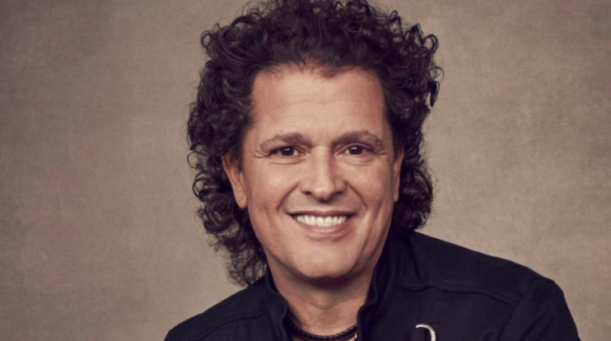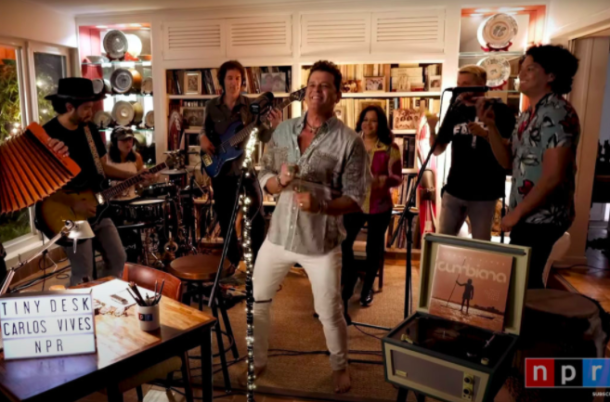Natalia LaFourcade has her hands full…
The 36-year-old Mexican singer-songwriter proved to be one of the night’s big winners at the Latin Grammys awards show, taking home three prizes, including one of the top awards.

LaFourcade, a Grammy and Latin Grammy darling, was nevertheless a surprise winner in the Album of the Year category with her Un Canto Por México, Vol. 1, a collection of songs dedicated to Mexico and arranged in traditional style.
LaFourcade also won best regional song for “Mi Religión” and best alternative song for “En Cantos,” alongside Ile and co-written with Ismael Cancel.
LaFourcade now raises her total of Latin Grammy wins to 14 after winning in every category she was nominated this year.
But she wasn’t the only top winner of the night…
Rosalía also took home three awards.
The 27-year-old Spanish singer won those awards due to two collaborations. “Yo x Ti Tu x Mi,” with Puerto Rican star Ozuna, won best urban fusion performance and best urban song, leading also to two Latin Grammy wins for Ozuna and one for Rosalía’s collaborator, El Guincho. And “TKN,” her collaboration with Travis Scott, won best short form video (directed by Nicolás Méndez, aka CANADA). She’s now an 8-time Latin Grammy winner.
Carlos Vives also claimed three awards.
The 59-year-old Colombian singer-songwriter’s “Canción para Rubén,” alongside Ruben Blades, won best tropical song while his album Cumbiana won best contemporary/tropical fusion album and the documentary El Mundo Perdido de Cumbiana won best long form video.
J Balvin, the top nominee of the evening, won the very competitive best urban album category for Colores, while Bad Bunny’s provocative “Yo Perreo Sola” won best reggaeton performance. The new category was one of the nods the Latin Recording Academy made this year toward appeasing a contingent of urban artists who felt neglected by the Latin Grammys.
The coveted record of the year award went to Alejandro Sanz’s “Contigo,” while song of the year went to Residente for his biographical beauty “René.”
In a surprise win, Mike Bahía took home the best new artist award, beating out some heavy competition, including Anuel AA, Nicky Nicole, Rauw Alejandro and Nathy Peluso.
“No, I didn’t expect this award,” he said backstage. “I’ve had beautiful career moments where awards, let’s say, haven’t really been with me. I didn’t think this would be the exception. But things happen for a reason, and I want to thank my colleagues for validating my work.”
Here’s the full winners list:
GENERAL FIELD:
Record Of The Year: “Contigo” — Alejandro Sanz
Album Of The Year: Un Canto Por México, Vol. 1 — Natalia Lafourcade
Song Of The Year: “René” — Residente, songwriter (Residente)
Best New Artist: Mike Bahía
Best Pop Vocal Album: Pausa — Ricky Martin
Best Traditional Pop Vocal Album: Compadres – Andrés Cepeda & Fonseca
Best Pop Song: “TuTu” – Camilo, Jon Leone & Richi López, songwriters (Camilo & Pedro Capó)
Best Urban Fusion/Performance: “Yo x Ti Tu x Mi” – Rosalía & Ozuna
Best Reggaeton Performance: “Yo Perreo Sola” — Bad Bunny
Best Urban Music Album: Colores – J Balvin
Best Rap/Hip Hop Song: “Antes Que El Mundo Se Acabe” – Residente, songwriter (Residente)
Best Urban Song: “Yo x Ti, Tu x Mi” – Pablo Diaz-Reixa “El Guincho”, Ozuna & Rosalía, songwriters (Rosalía & Ozuna)
Best Rock Album: “Dónde Jugarán Lxs Niñxs? – Molotov
Best Rock Song: “Biutiful” – Mon Laferte, songwriter (Mon Laferte)
Best Pop/Rock Album: La Conquista del Espacio – Fito Paez
Best Pop/Rock Song: “La Canción de las Bestias” – Fito Páez, songwriter (Fito Páez)
Best Alternative Music Album: Sobrevolando – Cultura Profética
Best Alternative Song: “En Cantos” – Ismael Cancel, Ile & Natalia Lafourcade, songwriters (Ile & Natalia Lafourcade)
Best Salsa Album: 40 – Grupo Niche
Best Cumbia/Vallenato Album: Sigo Cantando Al Amor (Deluxe) – Jorge Celedón & Sergio Luis Rodríguez
Best Merengue/Bachata Album: Ahora – Eddy Herrera &
Larimar – Daniel Santacruz (Tie)
Best Traditional Tropical Album: Ícono – Orquesta Aragón
Best Contemporary/Tropical Fusion Album: Cumbiana — Carlos Vives
Best Tropical Song: “Canción Para Rubén” – Rubén Blades & Carlos Vives, songwriters (Carlos Vives & Rubén Blades)
Best Singer-Songwriter Album: Mesa Para Dos – Kany García
Best Ranchero/Mariachi Album: Hecho en México — Alejandro Fernández Best Banda Album: Playlist – Chiquis
Best Tejano Album: Live In México – La Mafia
Best Norteño Album: Los Tigres del Norte At Folsom Prison – Los Tigres del Norte
Best Regional Song: “Mi Religión” – Natalia Lafourcade, songwriter (Natalia Lafourcade)
Best Instrumental Album: Terra – Daniel Minimalia
Best Folk Album: A Capella – Susana Baca
Best Tango Album: Fuelle y Cuerda – Gustavo Casenave
Best Flamenco Album: Flamenco Son Fronteras – Antonio Rey
Best Latin Jazz/Jazz Album: Puertos: Music from International Waters – Emilio Solla Tango Jazz Orchestra
Best Christian Album (Spanish Language): Soldados – Alex Campos
Best Portuguese Language Christian Album: Reino – Aline Barros
Best Portuguese Language Contemporary Pop Album: Apká! – Céu —
Best Portuguese Language Rock or Alternative Album: Amarelo – Emicida Best Samba/Pagode Album: Samba Jazz De Raiz, Claudio Jorge 70 – Cláudio Jorge
Best MPB (Musica Popular Brasileira) Album: Belo Horizonte – Toninho Horta & Orquestra Fantasma
Best Sertaneja Music Album: Origens [Ao Vivo Em Sete Lagoas, Brazil / 2019] – Paula Fernandes
Best Portuguese Language Roots Album: Veia Nordestina – Mariana Aydar — Best Portuguese Language Song: “Abricó-De-Macaco” — Francisco Bosco & João Bosco, songwriters (João Bosco)
Best Latin Children’s Album: Canta y Juega – Tina Kids
Best Classical Album: Eternal Gratitude – Paulina Leisring & Domingo Pagliuca; Samuel Pilafian, album producer
Best Classical Contemporary Composition: “Sacre” – Carlos Fernando López & José Valentino, composers (Carlos Fernando López)
Best Arrangement: “La Flor de la Canela” – Lorenzo Ferrero, arranger (Afro-Peruvian Jazz Orchestra)
Best Recording Package: Soy Puro Teatro – Homenaje a La Lupe – Pedro Fajardo, art director (Mariaca Semprún)
Best Engineered Album: 3:33 – Daniel Bitrán Arizpe, Daniel Dávila, Justin Moshkevich, George Noriega, Erick Roman, Paul Rubinstein & JC Vertti, engineers; Miles Comaskey, Najeeb Jones & Tony Maserati, mixers; Dale Becker, mastering engineer (Debi Nova)
Producer of the Year: Andrés Torres, Mauricio Rengifo
Best Short Form Music Video: “TKN” – Rosalía & Travis Scott / Nicolás Méndez aka CANADA, video director; Oscar Romagosa & Laura Serra Estorch, video producers
Best Long Form Music Video: El Mundo Perdido de Cumbiana – Carlos Vives / Carlos Felipe Montoya, video director; Isabel Cristina Vásquez, video producer




